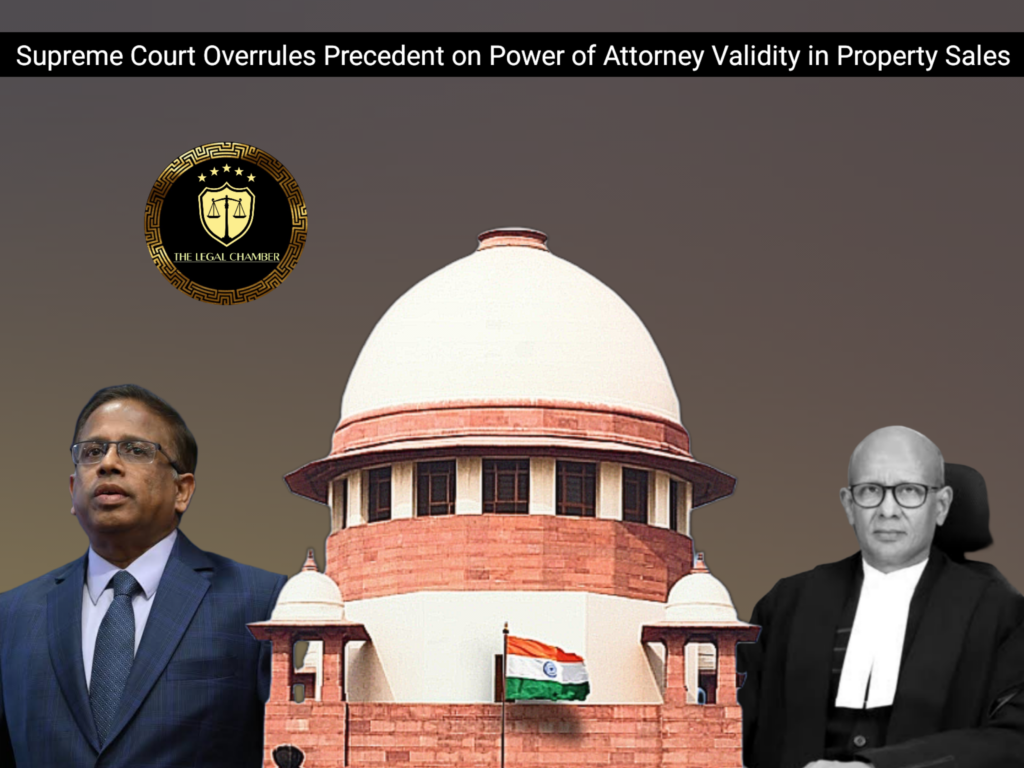
The Supreme Court examined the validity of documents executed by a Power of Attorney (PoA) holder under the Registration Act, 1908. It held that a PoA holder remains an agent, not an “executant” under Section 32(a), and must comply with Sections 32(c), 33, 34, and 35 for authentication. The court disagreed with the earlier Rajni Tandon ruling, emphasizing that a PoA holder cannot bypass statutory scrutiny while executing or presenting documents for registration. The issue was referred to a larger bench for clarity.
Facts Of The Case:
The case revolves around the validity of an Irrevocable General Power of Attorney (GPA) dated 15.10.1990, allegedly executed by Ranveer Singh and his wife, Gyanu Bai, in favor of their tenant, G. Rajender Kumar. Using this GPA, Rajender Kumar executed three sale deeds (16.11.1990, 18.07.1991, and 16.08.1991) in favor of his wife, G. Shashikala. Ranveer Singh later denied executing the GPA, leading to a legal dispute.The Trial Court framed issues on whether the GPA and subsequent sale deeds were valid. The High Court further examined whether the GPA was properly authenticated under Sections 32, 33, 34, and 35 of the Registration Act, 1908, and whether the Registrar verified Rajender Kumar’s authority under Section 34(3)(c). The Supreme Court analyzed whether a PoA holder executing a sale deed becomes the “executant” under Section 32(a) (allowing direct registration) or remains an agent requiring authentication under Sections 32(c) and 33.The Court disagreed with its earlier ruling in Rajni Tandon, which held that a PoA holder could present documents as an “executant” under Section 32(a) without strict authentication. Instead, it emphasized that a PoA holder acts only as an agent, and registrars must verify authority and identity under the Act. Due to conflicting interpretations, the matter was referred to a larger bench for final clarity.
Procedural History:
The case originated when Ranveer Singh and Gyanu Bai allegedly executed an Irrevocable General Power of Attorney (GPA) in 1990 in favor of G. Rajender Kumar, who later executed three sale deeds in favor of his wife, G. Shashikala. Ranveer Singh denied executing the GPA, leading to a civil suit. The Trial Court framed issues regarding the validity of the GPA and the sale deeds.On revision, the High Court examined whether the GPA was properly authenticated under Sections 32, 33, 34, and 35 of the Registration Act, 1908, and whether the Registrar complied with Section 34(3)(c) in verifying Rajender Kumar’s authority. The High Court relied on the Supreme Court’s earlier decision in Rajni Tandon v. Dulal Ranjan Ghosh Dastidar (2009), which held that a PoA holder could present documents as an “executant” under Section 32(a) without strict authentication.The matter reached the Supreme Court, which disagreed with the Rajni Tandon ruling, emphasizing that a PoA holder remains an agent and must comply with authentication requirements under Sections 32(c), 33, 34, and 35. Due to the conflicting legal position, the Supreme Court referred the case to a larger bench for a conclusive decision, directing the Registry to expedite the listing. The judgment was delivered on July 15, 2025, by a bench comprising Justices Sanjay Kumar and K.V. Viswanathan.
READ ALSO:Supreme Court Protects Bank Officer’s Pension Rights: Mandates Board Consultation for Deductions
Court Observation:
In its observations, the Supreme Court made several critical findings regarding the interpretation of the Registration Act, 1908. The bench expressly disagreed with its earlier ruling in Rajni Tandon, holding that a Power of Attorney (PoA) holder cannot be considered the “executant” under Section 32(a) of the Act when executing sale deeds. The Court clarified that a PoA holder remains merely an agent of the principal, and thus must comply with the strict authentication requirements under Sections 32(c), 33, 34, and 35 of the Act.The bench emphasized that the Registering Officer has a statutory duty to verify: (1) whether the document was executed by the purported parties; (2) the identity of the person appearing before them; and (3) the authority of the PoA holder under Section 34(3)(c). The Court noted that treating a PoA holder as an “executant” would create an incongruous situation where the mechanical act of presenting a document would face stricter scrutiny than the substantive act of executing it.Additionally, the Court highlighted that the recitals in the sale deeds themselves identified the principals—not the PoA holder—as the true executants, reinforcing that the holder merely acted on behalf of another. Due to the conflict with precedent and the need for clarity, the Court referred the matter to a larger bench for a conclusive ruling on these legal questions.
Final Decision & Judgement:
The Supreme Court, while acknowledging the conflicting precedent set in Rajni Tandon v. Dulal Ranjan Ghosh Dastidar (2009), declined to uphold the view that a Power of Attorney (PoA) holder could be treated as the “executant” under Section 32(a) of the Registration Act, 1908. Instead, the bench reaffirmed the agency principle, holding that a PoA holder merely acts on behalf of the principal and must comply with the mandatory authentication procedures under Sections 32(c), 33, 34, and 35 of the Act. The Court emphasized that the Registering Officer’s duty to verify the PoA holder’s authority is sacrosanct and cannot be bypassed. However, given the legal inconsistency with the earlier ruling, the bench stopped short of issuing a final verdict and instead referred the matter to a larger Bench for an authoritative decision. The judgment, delivered on July 15, 2025, underscored the need for legal certainty on this critical aspect of property transactions while directing the Registry to expedite the case’s listing before an appropriate Bench.
Case Details:
Case Title:G. Kalawathi Bai (Died) per LRs. vs. G. Shashikala (Died) per LRs. & Others Citation:(2025) INSC 851 Appeal No.:Civil Appeal Nos. 9497-9501 of 2025 Date of Judgment:July 15, 2025 Bench:Justice Sanjay Kumar & Justice K.V. Viswanathan
Download The Judgement Here